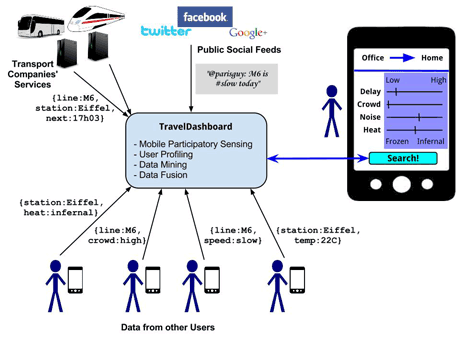by Licia Capra, Pierre Chatel, Animesh Pathak and Roberto Speicys Cardoso
European researchers and companies join hands to address the woes of the urban traveller.
With over 70% of the world’s population expected to be living in cities by 2050, the support of citizens’ mobility within the urban environment is a priority for municipalities worldwide [1]. Although public multi-modal transit systems are necessary to better manage mobility, they alone are not sufficient. Citizens must be offered personalized travel information to make their journeys more efficient and enjoyable. Notably, such information should not only be objective (eg, bus timetable, live bus tracking), but crucially personalized – since every passenger’s preferences and interests differ [2] (eg, crowdedness of trains, heat of tube platforms, sociability of the coaches).
Goal and objectives
Owing to the recent proliferation of smartphones, the relatively new field of mobile participatory sensing [3] could be leveraged towards providing a more fine-grained and up-to-date view of a city’s transportation system. A pan-European team including partners from Alcatel/Lucent, Ambientic, Inria, Systematic, Thales, Transport for London (TfL) and University College London (UCL), have pooled their resources for TravelDashboard; a project to produce an open source middleware platform, enriched with personalized mobility services for urban travelers, evaluated via real-life demonstrators’ assessments, and accompanied by novel business models. The partners will tackle:
- Development of a self-adaptive data collection middleware, that gathers both passive sensory information (eg, bus location from GPS) and active user-generated content (eg, road hazard reports, crowdedness of journey, etc.), and disseminates transport network status updates to travellers.
- Development of personalized mobility services, including: user preferences about various aspects of mobility (eg, punctuality, crowdedness, and sociability of transport systems); personalized information aggregators, to combine the data streams that are of interest to a user in their current context.
- Development of a demonstrator for real-life assessment, and deployment with actual end-users.
- Elicitation of viable Business Models, based on the services whose rapid development and deployment are supported by the middleware.
The middleware core is being worked on by Inria, Ambientic, and Thales; the planned added-value services are being developed by UCL and Alcatel; the demonstrator will be built and deployed under the experience of Ambientic, thanks also to key input from TfL; finally, Systematic brings the know-how to elicit business models for innovative technological services, for Ambientic to deliver new urban traveller services.
From research to innovation
This 12 month project (January to December, 2013) is funded by the European Institute of Innovation and Technology (EIT)’s “ICT Labs” knowledge and innovation community (KIC) under the “Intelligent Mobility and Transportation Systems” action line. The core goal of EIT ICT labs is to spur innovation in European ICT by leveraging results from ongoing research projects – as presented below for TravelDashboard. This activity expands on them by conducting domain-focused research, concretized through demonstrators, and by developing business models specifically tailored to the urban mobile participatory sensing domain. More precisely:
- Inria leverages its work on large scale mobile participatory sensing as part of the EC FP7 CHOReOS project on choreographies for the future internet, applying it to the urban transport domain, while Thales expands on the transportation-related use cases that it is developing as part of CHOReOS as well as the French ANR SocEDA project on large distributed social Event Driven Architecture (EDA) platform, focusing on user mobility and mobile device embedding aspects.
- UCL builds upon the recommender system it has been developing as part of the FP7 i-Tour project on intelligent urban transport systems, adding qualitative metrics such as crowdedness to its information filtering and data mining services.
- Alcatel-Lucent is involved in an ongoing project on Human Mobility Pattern Mining, which combines different sources of user mobility traces to understand how communities are formed. In TravelDashboard, their researchers perform an empirical study to understand mobility patterns and characteristics (time, mode, route and price) of different user groups, and identify contextual factors that dictate user mobility in order to improve their user profiling system.
- Founded on its work on multi-platform multimedia streaming service in the FP7 CONNECT project, the SME Ambientic leads the work on enabling access to data streams generated by mobile urban users, as well as the development of a mobile application for urban transport.
To enable the transfer from research to innovation, Systematic analyzes the business value of the TravelDashboard solution and identifies relevant business models and strategies for the development and provisioning of personalized mobility services in the urban crowd-sourcing context.

Impact: A Smart City for Smart Travellers
The TravelDashboard framework will be realized by adhering to the principles of Service-Oriented Architectures. At its core is the CHOReOS service-oriented middleware, atop which each partner is then responsible for the development of its own services. This core will be released as open-source software, thus promoting the rapid and easy development of applications in support of highly personalized urban travel experiences. Both municipalities and transport operators can use this platform to build smart applications to help citizens navigate their cities. One demonstrator application will be built and deployed during this project, catering to the London public transport infrastructure, contributing to the development of business models and strategies for the provisioning of personalized urban mobility services.
Link:
TravelDashboard project: http://www-roc.inria.fr/arles/traveldashboard
References:
[1] P. Bosnell: “Human Behaviours to Moving People More Intelligently”, 2006
[2] Rail Safety and Standards Board Ltd: “Topic Note on Travel Behaviour and Behavioural Change”, 2010
[3] N. Lane, E. Miluzzo, H. Lu, D. Peebles, T. Choudhury, and A. Campbell: “A survey of mobile phone sensing”, Communications Magazine, IEEE, 2010.
Please contact:
Pierre Chatel
Thales Group, France
Tel: +33 169415565
E-mail:











